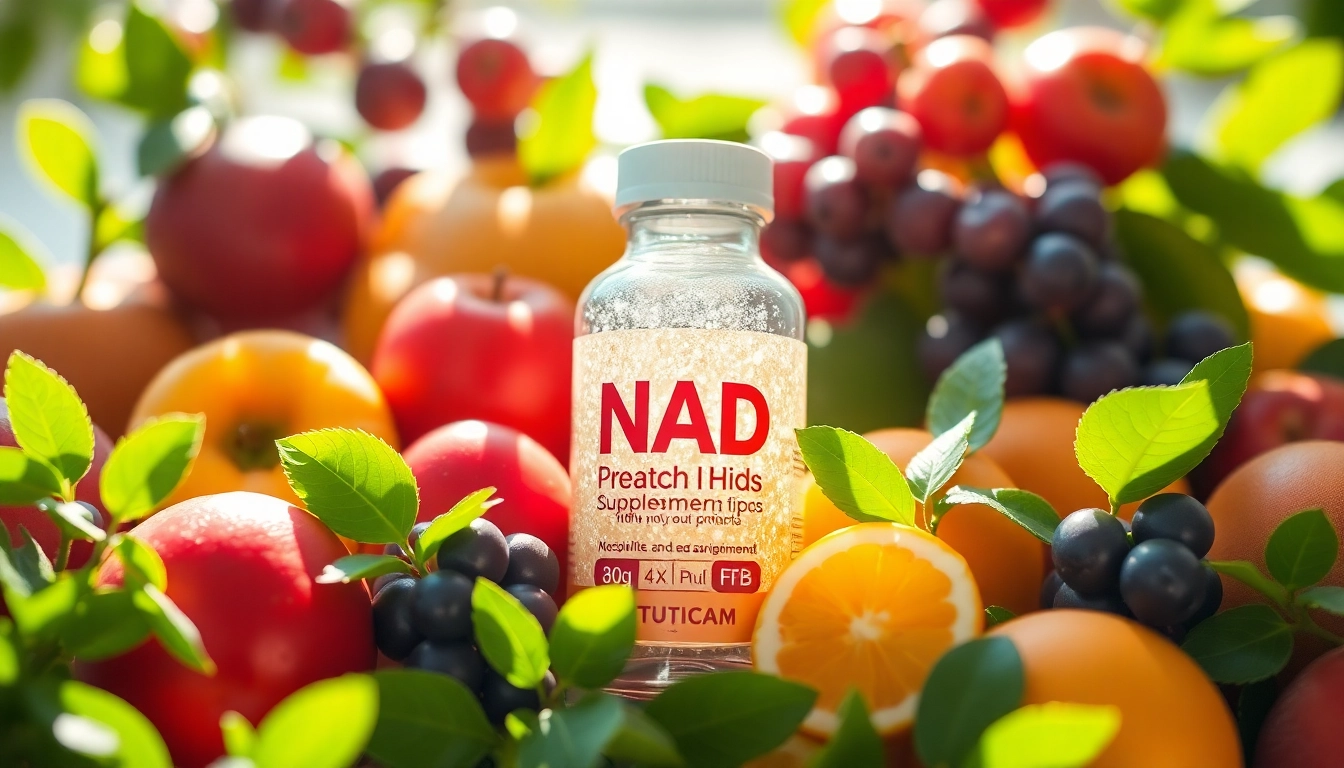The Role of NAD Supplement in Cellular Health
Nicotinamide adenine dinucleotide (NAD) has emerged as a key player in the field of cellular health and wellness. As our understanding of cellular biochemistry advances, the importance of NAD supplementation has gained significant attention. This compound plays a critical role in energy production, DNA repair, and the regulation of several metabolic pathways. Furthermore, studies indicate that NAD Supplement can offer various health benefits, including improved cognitive function and increased longevity. This article delves deep into the intricacies of NAD, its importance to cellular health, and how supplementation can potentially enhance overall well-being.
What is NAD and Why is it Important?
NAD is a coenzyme found in all living cells, pivotal in various biological processes. Its primary role involves facilitating redox reactions, which are essential for energy metabolism. In simpler terms, NAD helps convert food into energy by functioning as a hydrogen carrier. Without adequate NAD levels, our body struggles to produce adenosine triphosphate (ATP), the molecule that provides energy for cellular functions.
Additionally, NAD plays a crucial role in cellular repair mechanisms. It activates enzymes called sirtuins, which are involved in regulating cellular stress responses and promoting DNA repair. The depletion of NAD is a significant factor contributing to aging, as lower levels are linked to various age-related health issues. Research continually emphasizes the importance of maintaining optimal NAD levels to promote a healthy and balanced life.
Understanding Cellular Energy Production
Energy production in cells is primarily conducted through the processes of glycolysis, the citric acid cycle, and oxidative phosphorylation, where NAD acts as a vital cofactor. During glycolysis, glucose is broken down, leading to the formation of pyruvate and the generation of NADH. This NADH then feeds into the mitochondria during the oxidative phosphorylation phase to produce ATP. If NAD levels are low, this process can become inefficient, compromising cellular energy supply and function.
Moreover, NAD is also involved in facilitating metabolic reactions, helping convert carbohydrates, fats, and proteins into usable energy. This complex energy production system highlights the essential nature of NAD in ensuring our cells function optimally. Supplementing with NAD can help replenish declining levels, particularly as we age.
Key Benefits of NAD Supplementation
Supplementing with NAD offers various advantages spanning different aspects of health:
- Increased Energy Levels: As previously mentioned, NAD is crucial in generating energy within cells. Supplementation can boost energy levels, especially among those experiencing fatigue or low energy due to aging or lifestyle factors.
- Enhanced Cognitive Function: Research indicates that NAD supplementation may improve brain health, cognitive function, and memory due to its role in neurotransmitter regulation and protection against neurodegenerative diseases.
- Support for Metabolic Health: NAD supplements have been associated with improved metabolic regulation, including enhanced fat metabolism and insulin sensitivity, making them beneficial for those at risk of metabolic disorders.
- Longevity and Aging: By fostering DNA repair and activating sirtuins, NAD may contribute to increased longevity by promoting cellular health and reducing the effects of aging.
- Improved Recovery and Athletic Performance: Athletes may experience faster recovery times and enhanced performance due to the increased energy production supported by NAD supplements.
Common Sources of NAD Supplement
Natural NAD Booster Foods
While supplementation is effective, certain foods can naturally boost NAD levels. Here are some dietary sources that may help enhance NAD production:
- Dairy Products: Milk, cheese, and yogurt are rich in nicotinamide, a precursor to NAD.
- Green Vegetables: Spinach, broccoli, and peas provide nutrients that support NAD production.
- Meat and Fish: Poultry, beef, and fish are excellent sources of tryptophan, a crucial amino acid involved in NAD synthesis.
- Nuts and Seeds: Peanuts, sunflower seeds, and almonds contain niacin, which contributes to NAD production.
- Whole Grains: Brown rice, oats, and wheat products also offer niacin and other nutrients beneficial for NAD synthesis.
Choosing the Right NAD Supplement
When it comes to choosing an NAD supplement, several forms are available on the market, including:
- Nicotinamide Riboside (NR): A popular supplement that is easily absorbed by the body and effectively boosts NAD levels.
- Nicotinamide Mononucleotide (NMN): Another potent precursor to NAD that has gained popularity for its potential health benefits.
- Niacin (Vitamin B3): An essential nutrient that can also increase NAD levels but may sometimes cause flushing and other side effects.
When selecting a supplement, it’s essential to consider factors such as bioavailability, formulation, and any additional ingredients that could either enhance or detract from its effectiveness. Consulting with a healthcare provider for personalized recommendations is advisable before starting NAD supplementation.
Evaluating Quality and Purity in NAD Products
The quality and purity of NAD supplements are crucial for achieving the desired health benefits. Here are some tips for evaluating potential products:
- Look for Third-Party Testing: Reputable manufacturers often have their products tested by independent third-party laboratories to ensure quality and purity. Look for certifications on product labels.
- Check for Ingredient Transparency: Ensure that all ingredients are clearly listed, and avoid products with unnecessary fillers, additives, or artificial ingredients.
- Read Customer Reviews: Feedback from other users can provide insight into the product’s effectiveness and any potential side effects.
- Research Brands: Choose established brands with a solid reputation in the supplement industry.
How to Incorporate NAD Supplement into Your Routine
Dosage Recommendations for NAD Supplement
The optimal dosage for NAD supplements varies based on individual health goals and conditions. However, general guidelines suggest:
- Nicotinamide Riboside: Typical doses range from 250 mg to 300 mg per day.
- Nicotinamide Mononucleotide: Doses often range from 250 mg to 500 mg daily.
It is critical to start with the lowest dose and gradually increase based on individual tolerance and health objectives. Consulting a healthcare professional for specific recommendations tailored to personal needs is always advisable.
Timing Your NAD Intake for Maximum Effectiveness
The timing of taking NAD supplements can influence their effectiveness. Taking supplementation in the morning with breakfast may help boost energy levels throughout the day. Conversely, for people focused on muscle recovery or fatigue reduction post-exercise, taking the supplement in the evening or after workouts may be more beneficial.
Monitoring personal responses to the supplement can help optimize timing. Some individuals may need to experiment with different times to determine when they experience the most benefits.
Combining NAD Supplement with Other Vital Nutrients
NAD supplements can synergize with other nutrients for even greater effects. Here are some combinations to consider:
- Vitamin B Complex: These vitamins are essential for metabolism and cellular energy production. Combining B vitamins with NAD may enhance energy efficiency.
- Resveratrol: This powerful antioxidant is known for supporting sirtuin activity, which is closely associated with NAD levels. The combination could optimize cellular health.
- Coenzyme Q10: Important for mitochondrial function, CoQ10 can work alongside NAD to improve energy production.
When combining supplements, it is essential to consult a healthcare professional to ensure compatibility and address any potential interactions.
Potential Side Effects of NAD Supplement
Understanding the Risks of Supplementation
While NAD supplements are generally recognized as safe for most people, some may experience side effects. Common side effects can include:
- Nausea: Some users have reported feeling nauseous after taking NAD supplements.
- Flushing: Particularly with niacin, some may experience flushing or a warm sensation.
- Headaches: A few individuals have noted headaches when starting NAD supplementation.
Being aware of potential side effects and monitoring personal responses is crucial. For serious or persistent reactions, it is advisable to discontinue use and consult a healthcare provider.
Signs of NAD Supplement Intolerance
Identifying signs of intolerance is vital for ensuring the safe use of NAD supplements. Key indicators to watch for include:
- Unexplained fatigue or lethargy after taking the supplement.
- Increased anxiety or restlessness.
- Persistent gastrointestinal problems.
If you notice any symptoms that raise concerns, consult a healthcare professional for guidance. Making adjustments to dosage or discontinuing the supplement may be necessary based on professional advice.
Who Should Avoid NAD Supplements?
Though NAD supplementation is suitable for many, certain individuals should exercise caution or avoid it altogether:
- Individuals with chronic medical conditions, such as liver disease, should consult a healthcare professional before using NAD supplements.
- Those who are pregnant or breastfeeding should also seek medical advice before supplementation.
- People currently on certain medications or those with a history of allergies or sensitivities may need to avoid NAD supplements due to potential interactions or adverse effects.
Real-Life Success Stories and Case Studies
Athletes Benefiting from NAD Supplement
Many athletes have embraced NAD supplementation as a means to optimize their performance and recovery. Case studies highlight how athletes report faster recovery times after intensive training sessions. Improved endurance and enhanced mental clarity have also been frequently cited benefits. For example, a professional marathon runner documented significant improvements in their performance metrics and attributed them to their NAD supplement regimen.
Improving Quality of Life with NAD
Not just for athletes, everyday individuals have shared their positive experiences with NAD supplementation. Many report enhancements in daily living, such as boosted energy levels and improved mood states. An example includes a middle-aged individual who began supplementing with NR and found a notable increase in their overall vitality and mental focus, positively affecting their professional and personal life. These success stories underscore the potential impacts of NAD on general quality of life.
Research Insights on NAD Supplement Efficacy
Ongoing research continues to affirm the efficacy of NAD supplementation. Numerous studies indicate that NAD precursors like NMN and NR can significantly increase NAD levels in cells, leading to improved outcomes related to metabolism, cognitive function, and overall vitality. Clinical trials have specifically noted improvements in age-related decline and various metabolic conditions.
As the body of evidence grows, so does the legitimacy and acceptance of NAD supplementation among both the scientific community and health-conscious individuals looking to enhance their well-being.



